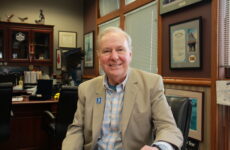Defrauding schools of financial aid is a major crime, but according to financial aid director Ean Freels, it is not a serious problem at DMACC.
“I wouldn’t consider it a large problem because an overwhelming majority of students are accessing it for the right purposes. When you talk about percentages, if a small percentage is perpetuating the problem it doesn’t really impact the program as being a large problem,” Freels said.
CBS News reports that between the years of 2009 and 2012, student aid fraud increased by 82 percent.
The measures financial aid departments put in place such as “red flagging,” are a direct result of that 82 percent, such as school hopping which is where a student has many colleges transferred in a short amount of time, said Freels.
There are many red flags that financial aid can spot when processing applications.
“What we do is, we identify who are the folks who are usually associated with fraud, what type of students, whether it be students from a distance, are there students we traditionally don’t serve from a particular area of Iowa,” Freels said.
Many of these fraud cases are due to a fraud ring.
Individuals will find friends, neighbors or even family, and will fill out the paper work for FAFSA.
The big red flag is when it all comes in at the same time, especially if it is from out of state.
More red flags are: people calling in continuously to find out when student aid will be handed out, or when a student seems overly interested in the loan process.
“I’m hesitant to call these people students because they are not, they are criminals who are stealing from the education system,” Freels said.
The Office of Inspector General investigates financial aid fraud; they are a part of the Department of Education.
Each year they get reports from all over the country, so it is not DMACC themselves who investigates.
Freels said online classes have presented new opportunities for fraud. A report from CBS also states that distance learning or Internet classes was an area where fraud is common.
There is no limit to how many loans DMACC can issue. It does affect students that do not commit fraud.
“As an institution, we are measured on our default rate for student loans. Lets say for example 30 percent of our students default on their student loans. If our default rate gets too high, and goes above 30 percent, then the government can step in and say you’re not counseling students properly in how to repay their student loans, so if our default rate gets too high they can take away our ability to offer those student loans.”
The Obama Administration has set in motion something new in student aid called “prior prior year.”
Students will file for their FAFSA with the taxes from two years ago rather than the year before.
This helps because if you are applying for FAFSA in the beginning of the year, you don’t have to wait until your taxes are done that year, and instead just use the taxes you already had done.
According to Freels this will be in effect by October of 2016.





Comments